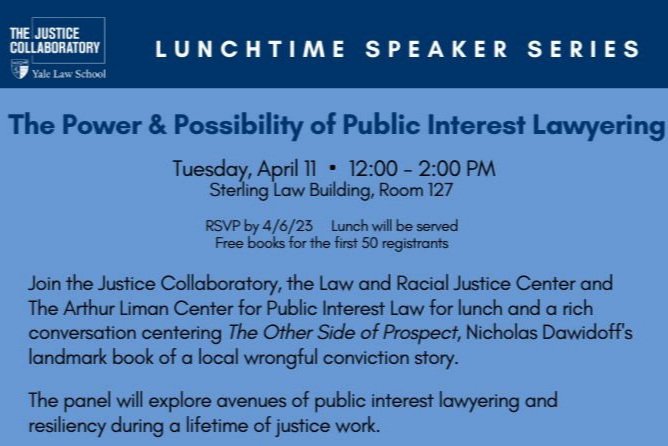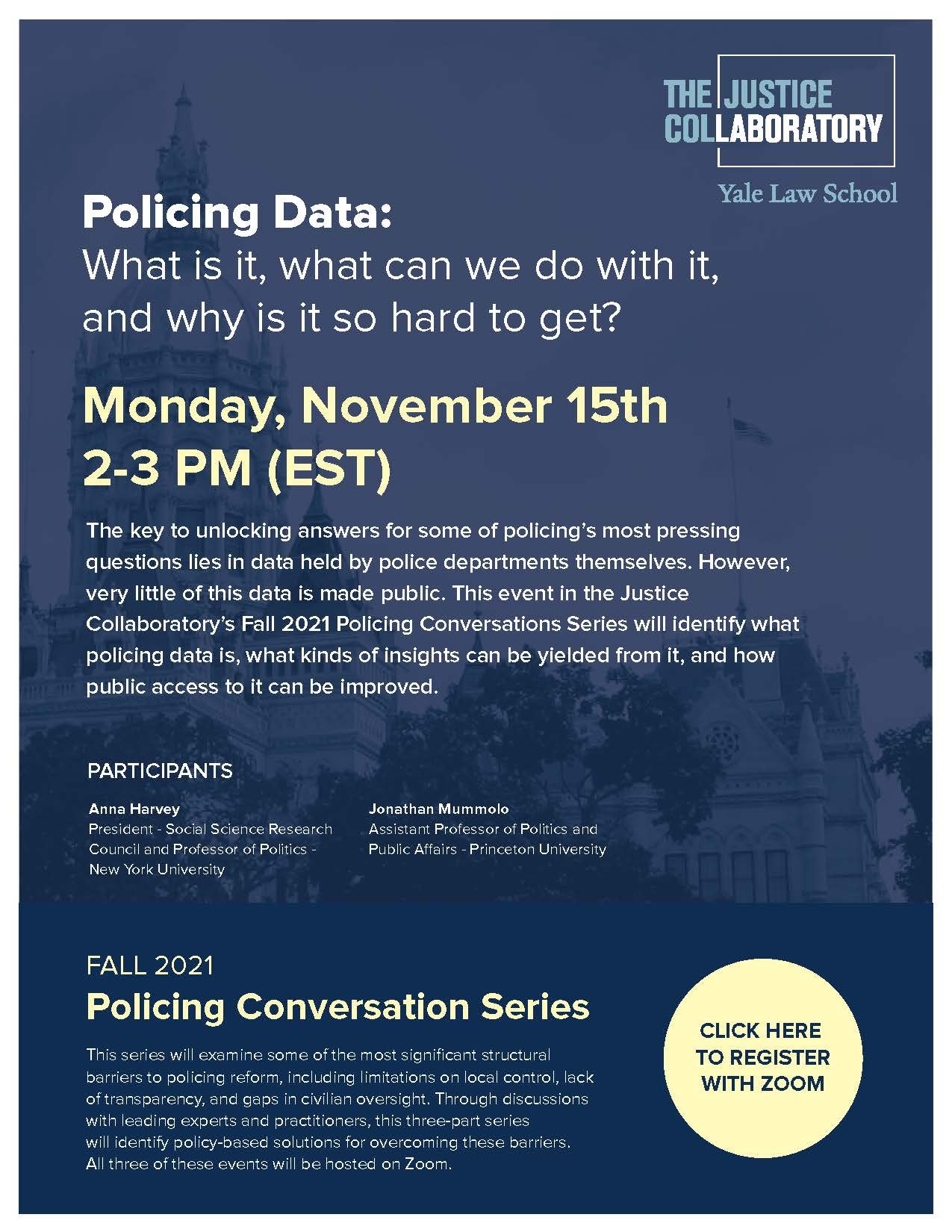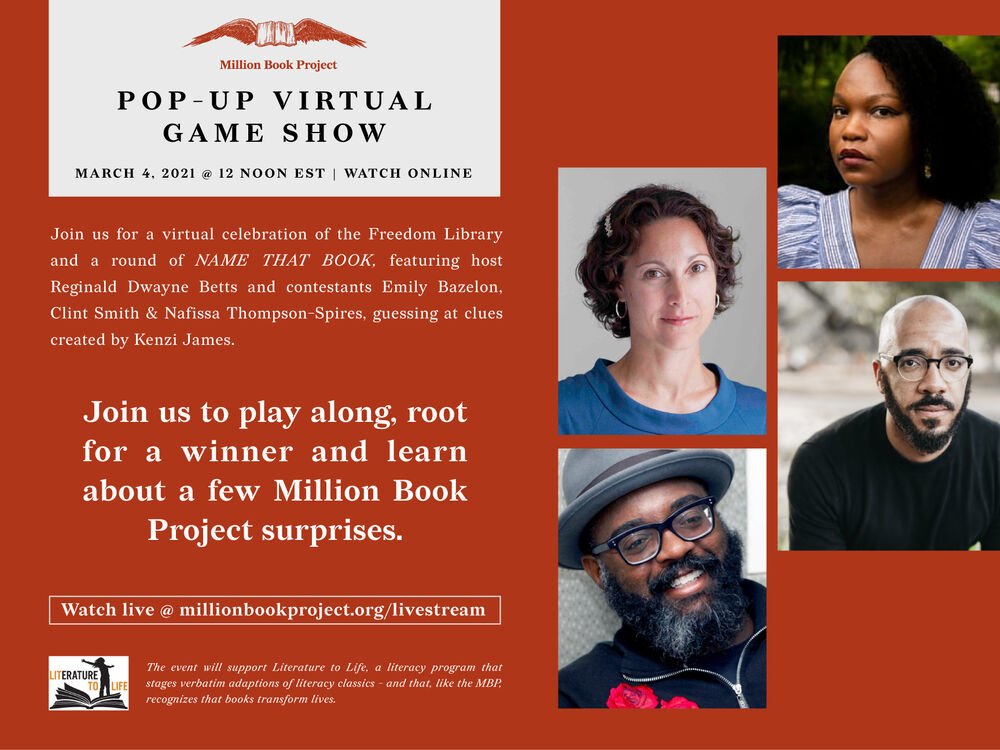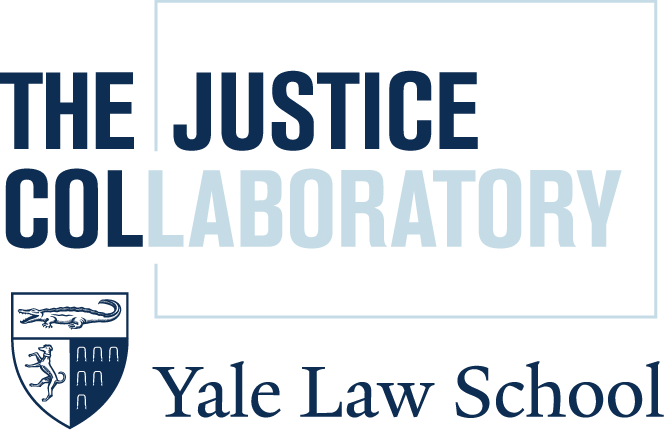Events

Legitimacy In An Online World
The goal of this conference continues ongoing efforts to become aware of and incorporate into our scholarship and instruction recent developments in the court system. The court system broadly conceived is the set of institutions and authorities that has the task of managing conflicts, enforcing rules/agreements, and providing just redress for injuries. This sprawling formal and informal system has never reflected the norms enshrined in idealized visions of the law. It has long been an informal system of settlement conferences and plea bargains. However, over the last several decades the form of these institutions and authorities has rapidly involved in a variety of ways. Those include online courts, written instead of oral communications and algorithmic decision-making.

Probation, Parole, and the Illusion of Safety and Freedom
Join The Justice Collaboratory & the Law and Racial Justice Center for lunch and a rich discussion centering on an important new book Mass Supervision: Probation, Parole, and the Illusion of Safety and Freedom. This bold work by Vincent Schiraldi, a longtime justice advocate, calls community corrections into question. This dynamic panel features people directly impacted by probation & parole alongside longtime reformers.

The Power & Possibility of Public Interest Lawyering
Join the Justice Collaboratory, the Law and Racial Justice Center and The Arthur Liman Center for Public Interest Law for lunch and a rich conversation centering The Other Side of Prospect, Nicholas Dawidoff's landmark book of a local wrongful conviction story.

Social Media Governance Initiative Spring 2023 Convening: Beyond Moderation
Since the Social Media Governance Initiative (SMGI) launched in 2018, we have witnessed many of the biggest online platforms continue to face increasing challenges ranging from harassment and hate speech to misinformation. Over this time, many of these platforms have made stunning investments constructing massive content moderation apparatuses consisting of complex policies, sophisticated machine learning, and thousands of human moderators reviewing and removing millions of pieces of content. However, as these content moderation systems continue to mature, many of the issues they seek to alleviate persist. Recently, many have started looking beyond content moderation instead turning towards broader platform governance and design for solutions.

Justice & Society Student Project Symposium
The Justice & Society Yale College course was co-taught by the Justice Collaboratory and the Department of African American Studies. In this seminar, students cultivated a rich understanding of the layered dimensions associated with community vitality.
In their final project, students created mixed-medium explorations regarding the vitality of a community of which they are a member, focusing on the impact of the criminal-legal system/s. This symposium featured highlights of these remarkable works.

Tech Law & the Humanities Symposium
In collaboration with the Yale Journal of Law & the Humanities, the JC is hosting a one-day symposium to explore the causes and cures for online harms from a multidisciplinary perspective. Come join our conversation about misinformation, cyberbullying, polarization, civility, and voice with scholars steeped in everything from theology and sociology to history and engineering.

Celebrate the Life, Art, & Legacy of Winfred Rembert (1945 - 2021)
The Justice Collaboratory at Yale Law School and Public Humanities at Yale honor beloved longtime New Haven resident Winfred Rembert—the late Georgia-born artist, Equal Justice Initiative honoree, and 2022 Pulitzer Prize-winning author of Chasing Me to My Grave: An Artist’s Memoir of the Jim Crow South—with a distinguished panel of intimates, artists, and scholars for an evening of discussion and community.

Policing Regulation and Oversight: Trends, Problems, and Solutions
Join us on August 16, 2022 at 1:00 p.m. EST as NACOLE and the JC welcome Jorge Camacho and Tracey Meares to discuss recent trends and problems in policing regulation. They will offer insights into how structural reforms—like achieving immediate transparency and redefining how state and local governments oversee policing—can usher a new era of effective policing oversight.

The JC Presents: A Cop Movie & Panel Discussion
Join us for a spellbinding big-screen movie going experience followed by a rich panel discussion.
The dynamic panelists - Justice Collaboratory member Professor Rodrigo Canales (SOM), Daniela Alatorre (Producer), Alexandra Zapata Hojel (Associate Producer & Impact Director), and Tony Reyes (Chief of Police (ret.) New Haven Police Department)—will share how vanguard policing research came to shape the script, the actors’ approach, and the roll out of this award-winning film by rising Mexican auteur Alonso Ruizpalacios.

Civilian Oversight of Policing: The features and limits of current approaches
Improved civilian oversight has been a component of most police reform agendas for the better part of a century. But what do we mean by “civilian oversight,” and what are the characteristics of different oversight models? In this final event in the Justice Collaboratory’s Fall 2021 Policing Conversation Series, we will scrutinize different approaches and discuss how they fit into the policing accountability landscape

Policing Data: What is it, what can we do with it, and why is it so hard to get?
The key to unlocking answers for some of policing’s most pressing questions lies in data held by police departments themselves. However, very little of this data is made public. This event in the Justice Collaboratory’s Fall 2021 Policing Conversations Series will identify what policing data is, what kinds of insights can be yielded from it, and how public access to it can be improved.

Master Class with Dacher Keltner
Dacher Keltner is a psychologist who studies how emotions like awe, compassion, desire, and pride, shape the individual's relationships as well as how individuals gain and lose power, status, and influence over others. He’ll share some of his work, followed by a discussion contextualizing his work within online community governance.

The Preemption Problem: How states block local reform and what to do about it
Many reform-minded cities and towns have encountered a significant roadblock: state laws that are specifically intended to prevent local reform. What are these laws, where are they in effect, and how can the obstacles they present be surmounted? This inaugural event in the Justice Collaboratory’s Fall 2021 Policing Conversation Series will offer answers.

Senator Chris Murphy on The Violence Inside Us: A Book Talk about Gun Violence
Please join the Solomon Center in welcoming Senator Chris Murphy to discuss his book The Violence Inside Us: A Brief History of an Ongoing American Tragedy.

Join Us For A Discussion Of: Redistributing the Poor: Jails, Hospitals, and the Crisis of Law and Fiscal Austerity
On Tuesday, May 4th at 2 PM, join The Justice Collaboratory and Armando Lara-Millán, Professor of Sociology at UC Berkeley for a discussion of Redistributing the Poor: Jails, Hospitals, and the Crisis of Law and Fiscal Austerity (Oxford University Press, 2021).

Teach-In Series Criminal Justice, Racial Justice, Policing, and the Derek Chauvin Trial
The Office of the Dean, in conjunction with the Liman Center, LSO, the Justice Collaboratory, and schools across the University, will be hosting a series of panels to examine the impact of the Derek Chauvin trial.

The Justice Collaboratory Presents #TeaAtTwo with Prof. Yanilda González (Harvard Kennedy School)
Join The Justice Collaboratory and Yanilda González, Professor of Public Policy at the Harvard Kennedy School, for a discussion of Authoritarian Police in Democracy: Contested Security in Latin America. In her timely book, González explains why coercive forms of policing have persisted in Latin America decades after democratic transitions.

Telegram governance: When the rule of thumb doesn't work
Join Dr. Farzaneh Badiei, Kaveh Azarhoosh, and Professor Ethan Zuckerman, for a discussion about Telegram, community governance mechanisms and possible solutions for protection of communities at risk on social media platforms.

The Million Book Project Presents - Name That Book! A Pop Up Virtual Game Show
Join the Million Book Project for a virtual celebration of the Freedom Library and a round of "Name That Book" with host Dwayne Betts and contestents Emily Bazelon, Clint Smith and Nafissa Thompson-Spires. Clues performed by artist Kenzi James. Tune in to play along, root for a winner and learn about a few MBP surprises!

Tea At Two Virtual Series
How should social media sites contend with harms users experience on the site, such as being targets of online harassment? Can harms be measured or quantified, and should they be? This talk will explore how different justice theories, such as restorative justice, racial justice, and reparative justice, can expose approaches for remediating harms experienced online.

Grey Areas: Universal Standards, Cultural Difference and Local Contexts in Social Media Content Moderation
How can we situate this new attempt at the universalization of norms in the context of past and ongoing universalist exercises such as, for example, International Human Rights. In this presentation, Baron will address these questions through an examination of content moderation policies and the controversies that surround them.

The Impact of Technology on Trust
With the pro-social theme in mind, we have organized our first SMGI’s #Tea@2 session. Our speaker is Paolo Parigi, a member of SMGI’s Research Network. Paolo will talk to us about how technology transforms human trust.

Challenges of Making Unbiased Decisions in a World of Data and Algorithms; Nisheeth Vishnoi, Professor of Computer Science, Yale
A combination of biased data and decontextualized models has led to a host of “intelligent” algorithms that are capable of reflecting and exacerbating human biases. As the use of such algorithms in societal contexts proliferates, the question arises: How can we redesign them to mitigate bias?

Fighting Gun Violence in Court
Leading litigators discuss their successes, setbacks, and strategies in taking on gun violence—and gun manufacturers—in court.

Lobbying Against Gun Control
The Justice Collaboratory welcomes Chelsea Parsons, VP of Gun Violence Prevention, Center for American Progress and Robyn Thomas, Executive Director, Giffords Law Center to Prevent Gun Violence as they speak on "Lobbying Against Gun Control: The Lobbyists, the Industry, and the Politics".

The Uses and Abuses of History in Second Amendment Cases
The Justice Collaboratory co-sponsored an event titled "The Uses and Abuses of History in Second Amendment Cases" with The Solomon Center for Health Law & Policy, Yale Legal History Forum, and the Yale Journal of Law & the Humanities. Guest speakers include Saul Cornell (Fordham), Jennifer Tucker (Wesleyan), Mark Frassetto (Everytown for Gun Safety).

Reimagining Jury Duty & Bail Reform in the 21st Century
The Justice Collaboratory co-sponsored an event with Dwight Hall at Yale to welcome Will Snowden, Director of the New Orleans VERA Institute of Justice office. Mr. Snowden presented on the topic of "Reimagining Jury Duty & Bail Reform in the 21st Century".

What's Broken About Social Media and Tech Companies
Join the Justice Collaboratory and ISP for a lunch talk with Mike Godwin on Wednesday, November 13, 2019 at noon in Baker Hall, Room 420 for "What's Broken About Social Media and Tech Companies, And How Do We Fix Them".

Facebook, Hate Speech, Misinformation, and Myanmar
The Justice Collaboratory welcomed Michael Lwin, CEO of KoeKoe Tech as he presented "Facebook, Hate Speech, Misinformation, and Myanmar". This event was co-sponsored with the Yale Computation & Society Initiative.

The Truth About Marijuana, Mental Illness, and Violence?
The Justice Collaboratory and the Solomon Center for Health Law and Policy co-sponsored a debate about the relationship between cannabis use, mental illness, and violence.
